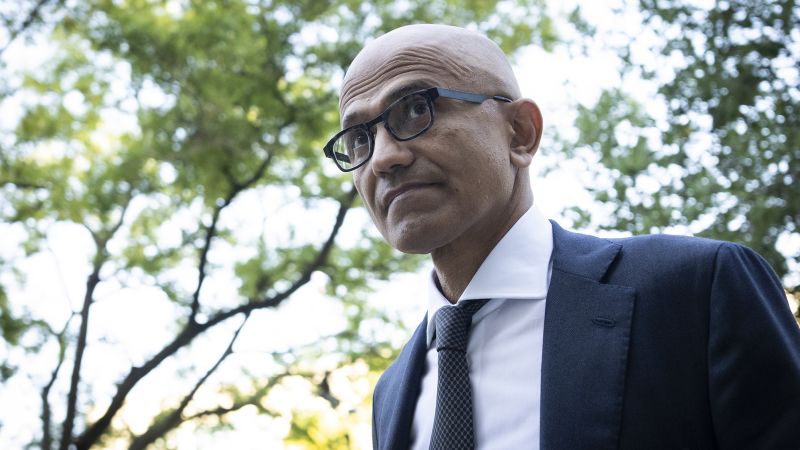Microsoft CEO Satya Nadella warned on Monday of a “nightmare” scenario for the internet if Google’s dominance in online search is allowed to continue, a situation, he said, that starts with searches on desktop and mobile but extends to the emerging battleground of artificial intelligence.
Nadella testified on Monday as part of the US government’s sweeping antitrust trial against Google, now into its 14th day. He is the most senior tech executive yet to testify during the trial that focuses on the power of Google as the default search engine on mobile devices and browsers around the globe.
Taking the stand in a charcoal suit and tie, Nadella painted Google as a technology giant that has blocked off ways for consumers to access rival search engines. His testimony reflected the frustrations of a long-running rivalry between Microsoft and Google whose tensions have permeated the weeks-long trial. (Google didn’t immediately respond to a request for comment.)
Central to Google’s strategy has been its agreements with companies such as Apple that have made Google the default search engine for millions of internet users.
“You get up in the morning, you brush your teeth, you search on Google,” Nadella said.
Nadella testified that every year he has been Microsoft’s CEO, he has unsuccessfully sought to persuade Apple to switch away from Google as its default search partner. Nadella added that Microsoft has been willing to spend close to $15 billion a year for the privilege. (A senior Apple executive, Eddy Cue, testified last week that Apple has always considered Google the best search product for its users, a claim echoed by Google itself throughout the trial.)
However, even more worrisome, Nadella argued, is that the enormous amount of search data that is provided to Google through its default agreements can help Google train its AI models to be better than anyone else’s — threatening to give Google an unassailable advantage in generative AI that would further entrench its power.
“This is going to become even harder to compete in the AI age with someone who has that core… advantage,” Nadella testified.
Despite being profitable, and despite investing some $100 billion in it over the past 20 years, Microsoft’s Bing search engine has only a single-digit market share in mobile search, and only slightly more — into the teens — in desktop search, Nadella said, adding that one of his dreams has been to see Bing account for at least 20% of the market in both segments.
Bing has struggled to grow its market share in part because being the default search provider for billions of devices means Google receives enormous amounts of data through search queries that helps Google understand at scale what users are likely to be interested in, Nadella noted. And for years, that “dynamic data” has enabled Google to stay ahead of Bing, he added.
“Every misspelling of a new movie, every local restaurant whose name you mistype,” Nadella explained, “…is a very critical asset to have your search quality get better.” And because the physical world is constantly changing, capturing shifts in search trends are essential to helping a search engine stay relevant as historical data becomes less relevant. Nadella previously led Microsoft’s cloud computing business and before that had spent several years overseeing the engineering team responsible for search and advertising at the company, making him well-versed in Bing’s various challenges.
Now, Nadella has said that the same data advantage could create “even more of a nightmare” as large language models compete on the basis of the data they are trained on.
“What is concerning is, it reminds me of what happened with distribution deals [in search],” he testified.
Under questioning by a Google attorney, Nadella admitted that in some cases, defaults are not the sole determinant of success: Google was able to overcome Microsoft’s own Internet Explorer defaults on Windows PCs to become the market-leading desktop web browser.
But Nadella attributed Google’s success to the relative openness of the Windows platform, arguing that on more tightly controlled mobile operating systems, and in search, default status plays a much larger role than in competition for desktop web browsers.
In addition to training its models on search queries, Google has also been moving to secure agreements with content publishers to ensure that it has exclusive access to their material for AI training purposes, according the Microsoft CEO. In Nadella’s own meetings with publishers, he said that he now hears that Google “wants … to write this check and we want you to match it.” (Google didn’t immediately respond to questions about those deals.)
The requests highlight concerns that “what is publicly available today [may not be] publicly available tomorrow” for AI training, according to the testimony.
While Microsoft and Apple have their own defaults — for example, by making Apple Maps the default maps app on iOS devices — Google goes much further than other tech companies in using “carrots and sticks” to keep people using its products by default, Nadella claimed. He cited Google’s licensing requirements that make Google’s Play Store a required installed app as a condition of using the Android operating system — another topic of dispute in the trial. The equivalent would be if Microsoft threatened to withhold Microsoft Office if Bing were not the default search engine, Nadella said, a move he claimed would not be in Microsoft’s business interests.
Acknowledging that Google would not be in its dominant position without Microsoft’s own antitrust battles with the US government in the 1990s, Nadella said the situation involving Google today is vastly different. Internet search and, particularly on mobile devices, is the single largest software business opportunity in the world.
Google’s dominance in search is reinforced when websites and publishers optimize for Google’s search algorithm and not Bing’s, when advertisers flock to Google and when users stick to what’s familiar, Nadella argued.
In his fruitless negotiations with Apple, Nadella said he has tried to argue that Bing’s current role is little more than as a useful tool for Apple to “bid up the price” of hosting Google as the default search provider — but that Bing provides an important counterweight to Google and that Apple should consider investing in the Microsoft alternative for competition’s sake. Nadella has also proposed running Bing on Apple devices as a kind of “public utility,” he said.
“Let’s say Bing exited the market,” Nadella said. “You think Google would keep paying [Apple]?”
Read the full article here











Leave a Reply